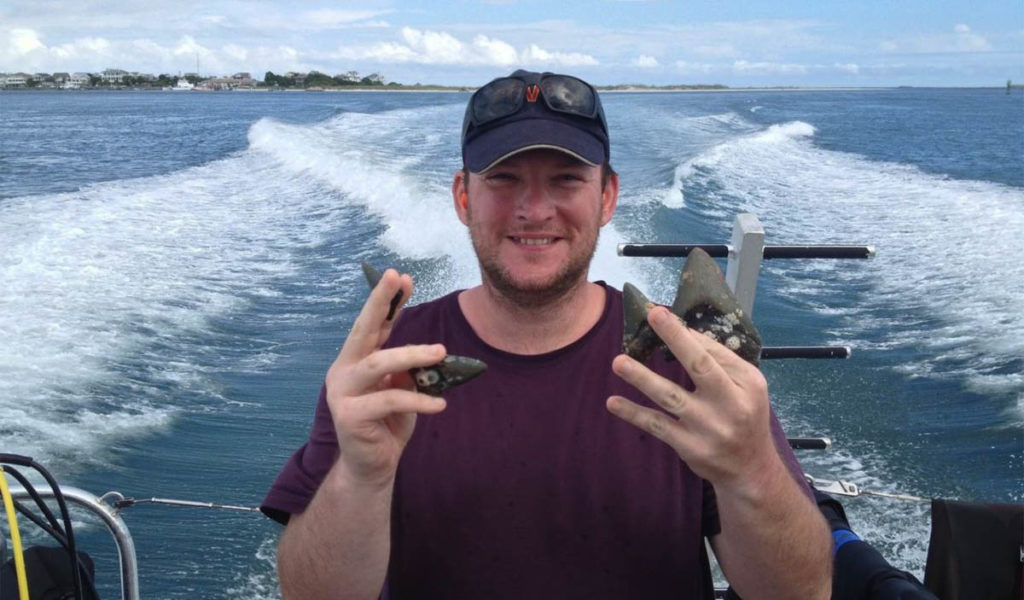There were many stops along the way in MITRE employee Frank Lewis‘ early career that would have been perfect settings for taking the plunge into scuba diving. The caverns and reefs of Greece. Bluefish and Whaler coves near Monterey, Calif., along with some 60-other shore-diving sites less than three hours from his house. Any number of places in the United Kingdom, where you’re never more than 72 miles away from the Atlantic Ocean.
But for Lewis, the “a-ha” moment came in a sporting goods store near Los Angeles. Then 38, Lewis went to the section of the store featuring scuba diving equipment, along with information about a free class. He signed up—and soon found himself at the bottom of a pool under 12 feet of water.
“You know those dreams you have when you’re a kid about being a fish underwater?” Lewis says. “I got that same feeling, and it was amazing. It was almost a feeling of euphoria.”
Despite starting late, Lewis, now 45, is making up for lost time. He made it to many of the diving sites in Southern California that had once been so close. He’s been to North Carolina and will lead a trip there next year. Lewis has also gone on dives looking for megalodon shark teeth. He has a giant box of shark teeth, ranging in age from 1.5 to 20 million years old, at his house. He marvels at finding remains that “were waiting here for millions of years… before there were people on this continent, this thing was down there, waiting for me to come and find it.”
Now, Lewis is teaching others how to find it, too.
“I never thought this would be a possibility.”
In addition to working at MITRE and diving for recreation, Lewis finds time to teach scuba diving through Columbia Scuba in Columbia, Md. In the year he’s been a diving instructor, Lewis has taught individuals and groups as large as eight. For Lewis, the memories of his feelings after breathing underwater for the first time move him to teach others how to experience that same sense of exhilaration—even those who feel their disabilities put it out of reach.
The Handicapped Scuba Association (HSA) has created a program for teaching and accompanying scuba divers with disabilities. In March, Lewis became an HSA instructor after spending a long weekend in training at the Eastern Academy of Scuba Education house in Vero Beach, Fla. The training, which Lewis related in his blog “Dive With Frank,” included sessions in both open and confined water, with trainees role-playing both disabled divers and their instructors. He also learned the steps to protecting disabled divers, such as equalizing their ears when they go up and down in the water.
“I got a call recently from a woman, a below-the-knee amputee,” Lewis says. “When we talked, I could hear this excitement in her voice—’Oh my God, I never thought this would be a possibility.’ And that’s exactly the reason I want to teach people to dive.”
Not Always a Vacation
That same commitment to helping others drives one of Lewis’ other passions: public safety diving. He serves as the dive operations coordinator for the Fifth District Volunteer Fire Department in Clarksville, MD—effectively, he runs the department dive team, a role he wasn’t expecting to take on after only five years as a volunteer. Lewis was looking for opportunities to dive, and the fire department, as he puts it, “needed people who were serious about diving and had the desire to put up with the fact that it wasn’t a vacation.”
And it isn’t: Lewis’ emergency dives have included searches for bodies—which are thankfully rare—and, one midsummer night, a search for a gun that someone had reportedly thrown away in a small pond (the search was called off the next morning, and the weapon was never found).
“Being able to dive and to do work that’s valued by the community, it’s unbelievable for me,” Lewis says.
Diving now affects virtually every non-work decision Lewis makes, from where he’ll take his next vacation to where he might retire. He jokes that diving is “my delayed retirement plan … I expect to be doing this well into my 80s.”
So, chances are good Lewis will eventually come to a body of water near you. And just maybe, he’ll try to coax you to jump in.
“I’ve talked to so many people who were amazed that it wasn’t that hard,” Lewis says. “The bar of entry to get to be an elite diver is another story, but to just learn and be able to explore the world, to dip your toe in it, it’s doable. It’s like an elephant. How do you eat an elephant? One bite at a time. Well, it’s not a very big elephant.”
Article originally featured at https://www.mitre.org – The MITRE Corporation is a not-for-profit company that operates multiple federally funded research and development centers (FFRDCs)
Article written by Russ Woolard of The MITRE Corporation





